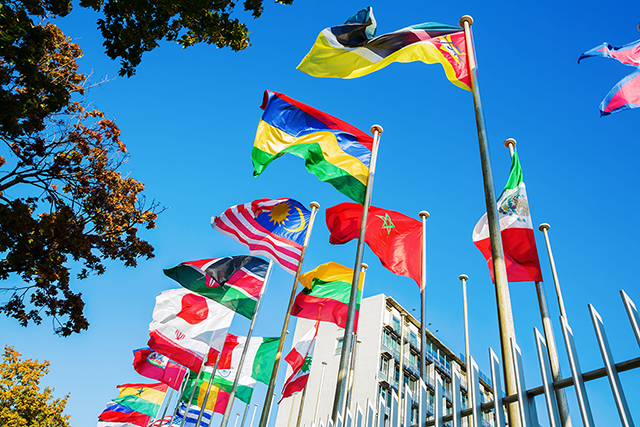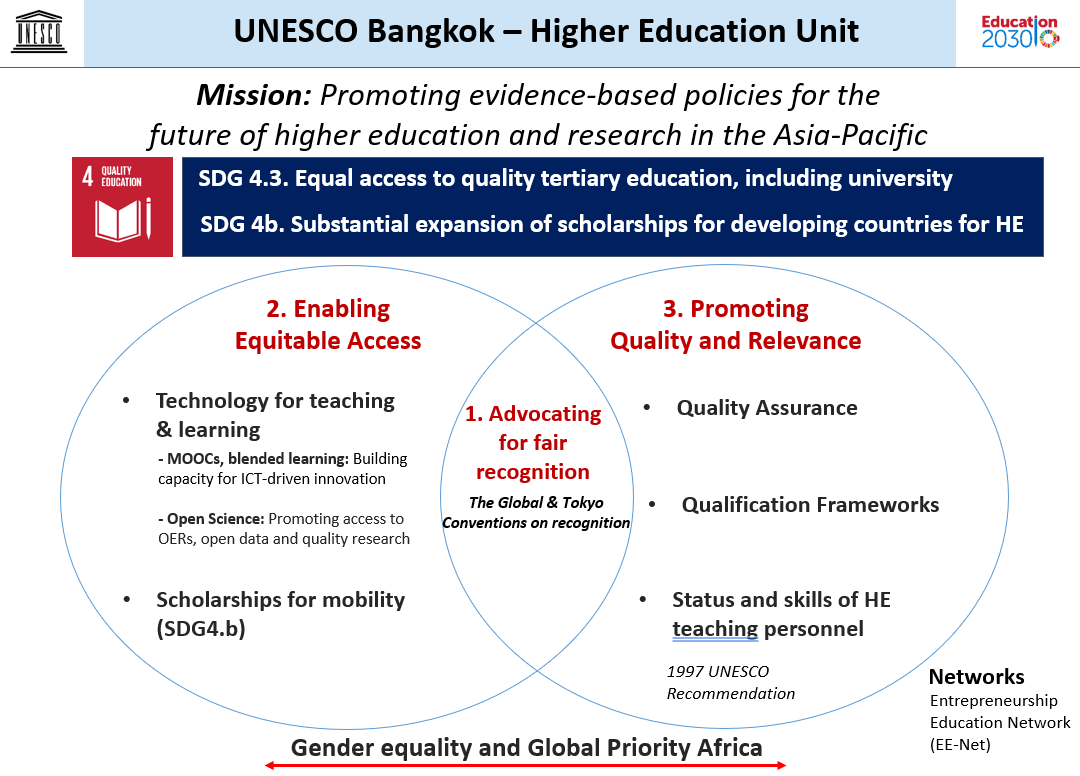Higher Education-About-us
Building capacity for evidence-informed policies in higher education
Ensuring equal access for all women and men to affordable and quality higher education is a fundamental human right under Sustainable Development Goal Four (SDG4) Target 4.3. As the only UN agency with a mandate in higher education, UNESCO has a unique role in building national capacities for quality higher education and research.
To do so, UNESCO Bangkok conducts policy-relevant research, organizes interactive capacity-building events, and shares lessons learned with partners in 46 countries throughout Asia and the Pacific. Accelerating progress towards SDG4, three priority areas below build capacity for evidence-informed policies in the Asia-Pacific region.
- Advocating for fair recognition of qualifications in the Asia-Pacific
The Asia-Pacific Regional Convention on the Recognition of Qualifications in Higher Education (Tokyo Convention) is an important legal instrument to promote fair recognition of higher education qualifications through basic principles and increased information provision in the region. As Secretariat of the Tokyo Convention Committee, UNESCO supports ratification and implementation of the convention by building national level awareness and capacities, and promoting collaboration among countries in Asia and the Pacific.
The Asia-Pacific Network of National Information Centres (APNNIC) is responsible for implementation of the Tokyo Convention. The APNNIC portal provides free and authoritative information on the recognition of qualifications to help facilitate physical or virtual mobility of students and academics.
- Enabling equitable access to higher education for all women and men
Ensuring equitable access to higher education for all women and men is a fundamental mandate for UNESCO. In this regard, technology has the potential to promote quality and access to education through the effective use of ICTs, such as online learning, open and distance learning (ODL), Massive Open Online Courses (MOOCs) and blended learning, which can improve teaching and learning and help to promote effective institutional governance. In November 2020, State Parties to the Tokyo Convention issued a Statement on COVID-19 that underlined the importance of fair recognition of online and blended learning.
In addition, UNESCO focuses on expanding scholarship programmes for less developed countries and small island developing states in the Asia-Pacific region, which can widen international opportunities for young people who may not otherwise have access to quality higher education as the Sydney Statement clearly states.
- Promoting the quality and relevance of higher education
UNESCO promotes quality and relevance in higher education through diverse initiatives, including effective use of learning outcomes and how to build regional and local capacity for a “living quality culture in higher education” (Shenzhen Statement, 2017). In addition, promotion of the role and professional status and skills of higher education teaching personnel (i.e. 1997 UNESCO Recommendation) is also a critically important means to ensure quality and relevant higher education opportunities for all.
Networks:
- The Asia-Pacific Regional Convention on the Recognition of Qualifications in Higher Education (Tokyo Convention Committee)
- Asia-Pacific Network of National Information Centres (APNNIC)
- UNESCO Entrepreneurship Education Network (EE-Net)
Additional Resources:
- UNESCO Headquarters’ webpage for Higher Education
Browse the sidebar on the left to find information on recognition, quality assurance, reform and innovation, and much more. You can also access publications and get the latest news on higher education. - UNESCO Conventions and Recommendations
Through this webpage, you can access more information on the regional conventions, see the full texts and find lists of State Parties.
Join the Higher Education listserv:
Subscribe to our email listserv to stay informed about UNESCO Bangkok’s latest news and events, programmes and projects, and resources for higher education.





